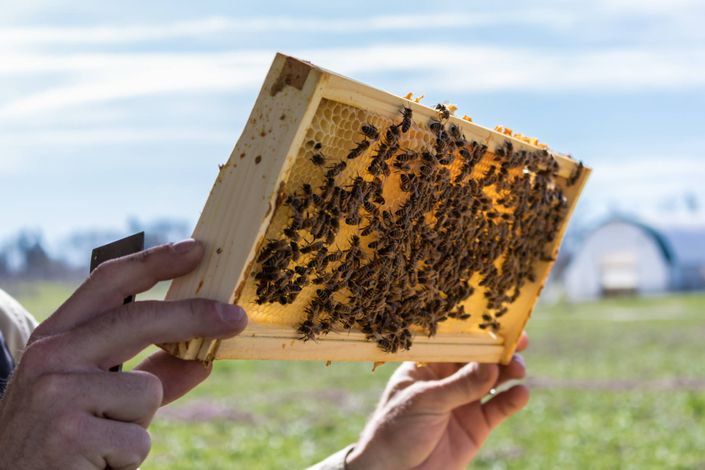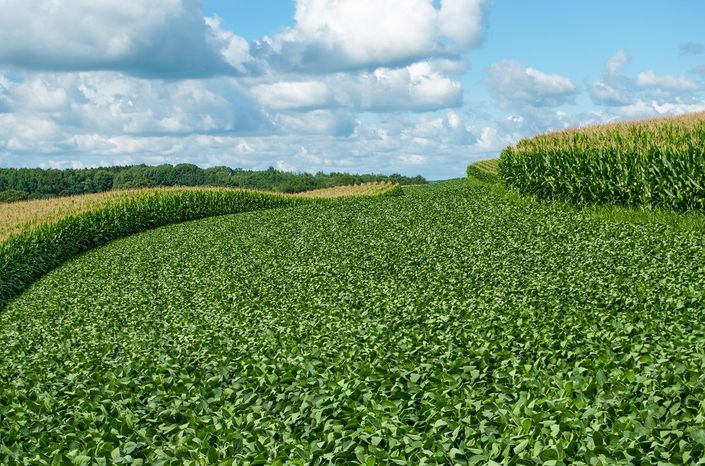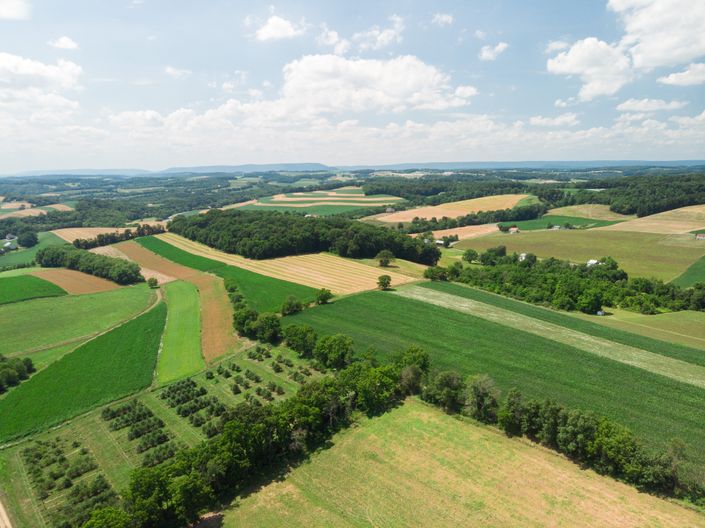What is “certified organic?” What does it cost, and what’s the benefit? How do I know if I’m doing it right? If you’ve ever asked any of these questions, Rodale Institute’s Transition to Certified Organic Agriculture course is for you!
This on-demand, online course was designed to help farmers understand the USDA National Organic Standards and use them as a framework for their successful transition to certified organic production of vegetables, grains, livestock, and more.
This course will guide you through the basics of transitioning to certified organic alongside the global leader in organic farming. You’ll benefit from decades of research and experience from Rodale Institute staff, in addition to special guests, partners, and farmers.
This course is for:
- Conventional farmers interested in what it means to become certified organic
- Farmers currently in transition to certified organic production
- Farmers interested in integrating organic practices into their current farming operation
- Agriculture extension professionals, educators, and consultants
- Anyone who wants to learn about organic practices and what certification means
In this course, you will:
- Learn about the benefits of transitioning to organic production and the obstacles to watch out for
- Understand the process of transitioning to organic
- Develop a clear understanding of the USDA National Organic Program (NOP) rules & regulations for the production, handling, labeling, and marketing of organic products
- Hear about the transition process directly from certified organic farmers
- Identify how to plan for and execute a successful transition to organic production
Course Curriculum
- 2.1. INVESTING IN SOIL (6:13)
- 2.2. READING THE SOIL (17:24)
- 2.3. THE SOIL FOOD WEB (11:49)
- 2.4. WHY YOU NEED COVER CROPS (11:35)
- 2.5. COMPOST FOR SOIL FERTILITY AND CROP NUTRIENT MANAGEMENT (7:21)
- 2.6. INTRODUCTION TO ORGANIC NO-TILL SYSTEM (1:50)
- 2.7. TRANSITIONING TO ORGANIC NO-TILL GRAINS (22:08)
- 2.8. RESOURCES
- MODULE 2 SELF-EVALUATION
- 3.1. PROTECTING ORGANIC CROPS - BARRIERS AND BUFFERS (6:04)
- 3.2. CROP ROTATIONS AND COVER CROPS (7:23)
- 3.3. VEGETABLE CROPS MANAGEMENT (12:12)
- 3.4. SOURCING SEEDS AND PLANTING STOCK (10:03)
- 3.5. ORGANIC WEED CONTROL (23:02)
- 3.6. ORGANIC INSECT PEST MANAGEMENT (16:28)
- 3.7. ORGANIC DISEASE MANAGEMENT (10:41)
- 3.8. RESOURCES
- MODULE 3 SELF-EVALUATION
- 4.1. INTEGRATING LIVESTOCK INTO YOUR ORGANIC FARM OPERATION (5:01)
- 4.2. LIVING CONDITIONS (22:19)
- 4.3. PASTURE RULE (9:02)
- 4.4. AVAILABLE FORAGE (19:42)
- 4.5. DAIRY COWS (39:57)
- 4.6. SHEEP (33:57)
- 4.7. GOATS (35:56)
- 4.8. BEEF CATTLE (27:41)
- 4.9. SWINE (27:36)
- 4.10. MEAT BIRDS (34:35)
- 4.11. LAYERS (17:43)
- 4.12. PROTECTING ANIMAL HEALTH (1:38)
- 4.13. PROCESSOR HANDLER RULE (4:04)
- MODULE 4 SELF-EVALUATION
- 5.1. INTRODUCTION TO MARKETING
- 5.2. CREATING A MARKETING PLAN (6:19)
- 5.3. ENTERING THE COMMODITY SUPPLY CHAIN (37:24)
- 5.4. WHOLESALE PRODUCE MARKETING (5:46)
- 5.5. COOPERATIVE MEMBERSHIP (5:45)
- 5.6. FARMER-RETAILER RELATIONSHIPS (20:02)
- 5.7. DIRECT MARKETING TO CONSUMERS (17:45)
- 5.8. WORKING WITH CERTIFIED ORGANIC HANDLERS AND PROCESSORS (13:39)
- 5.9. SELLING TO RESTAURANTS (6:50)
- 5.10. FORMING INSTITUTIONAL PARTNERSHIPS – FARM TO HOSPITAL (27:42)
- 5.11. FORMING INSTITUTIONAL PARTNERSHIPS – FARM TO SCHOOL (11:57)
- 5.12. BUILDING YOUR BRAND (8:00)
- MODULE 5 SELF-EVALUATION
- 6.1. BASIC PRINCIPLES OF ORGANIC FARMING (4:52)
- 6.2. LAND AND CROP MANAGEMENT REGULATORY REQUIREMENTS (20:42)
- 6.3. CROP STORAGE AND HANDLING (6:51)
- 6.4. THE NATIONAL LIST (9:12)
- 6.5. MATERIALS REGULATIONS (9:52)
- 6.6. RECORDKEEPING (50:22)
- 6.7. THE ORGANIC SYSTEM PLAN (OSP) (3:42)
- 6.8. THE CERTIFICATION PROCESS (4:45)
- 6.9. INSPECTIONS AND ENFORCEMENT (4:13)
- 6.10. ORGANIC HANDLING AND PROCESSING (4:04)
- 6.11. RESOURCES
- MODULE 6 SELF-EVALUATION

Dr. Andrew Smith
Chief Operating Officer
Rodale Institute
Dr. Andrew Smith is responsible for the administration of all research activities as well as leading and expanding the Research team’s impact on a global stage. Dr. Smith earned a Bachelor of Science in Agronomy at Cornell University, a Master of Science in Entomology at the University of Maryland and a Ph.D. in Environmental Science at Drexel University in Philadelphia.

Emily Newman
Consulting Program Manager
Rodale Institute
Emily is responsible for all program activities developed to assist farmers across the United States with their transition to organic and regenerative organic agricultural practices and help to bring them in compliance with USDA-NOP regulations and processes. Emily obtained her B.S. in Environmental Resource Management from Penn State University, is a Certified Crop Advisor and IOIA Certified.
For a complete list of 41 instructors see the "Before you Start" section of the curriculum

Sam Malriat, Director Organic Crop Consultancy
Rodale Institute
Sam is in charge of all consulting services for farmers, landowners, and businesses interested in transitioning land to certified organic and regenerative production systems. He earned a B.S. in Agricultural Sciences from Cornell University, is a Certified Crop Adviser and IOIA Certified in Crops and Livestock.
Frequently Asked Questions
When does the course start and finish?
The course is a completely self-paced online course — you decide when you start and when you finish.
How long do I have access to the course?
After enrolling, you have unlimited access to this course for as long as you like — across any and all devices you own.
Will I get a grade/credit or certificate?
No grades/credits will be given in this course, but you will receive a Certificate of Completion once you finish all the lessons.
What if I have questions or need help?
If you have any issues with your enrollment, please contact us at education@rodaleinstitute.org




